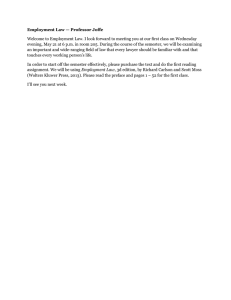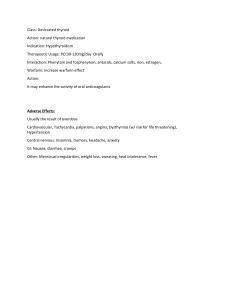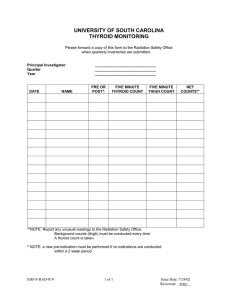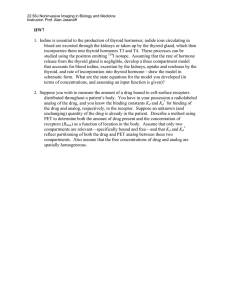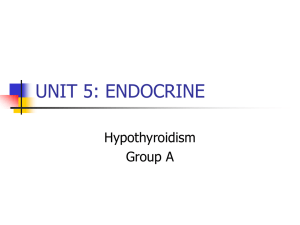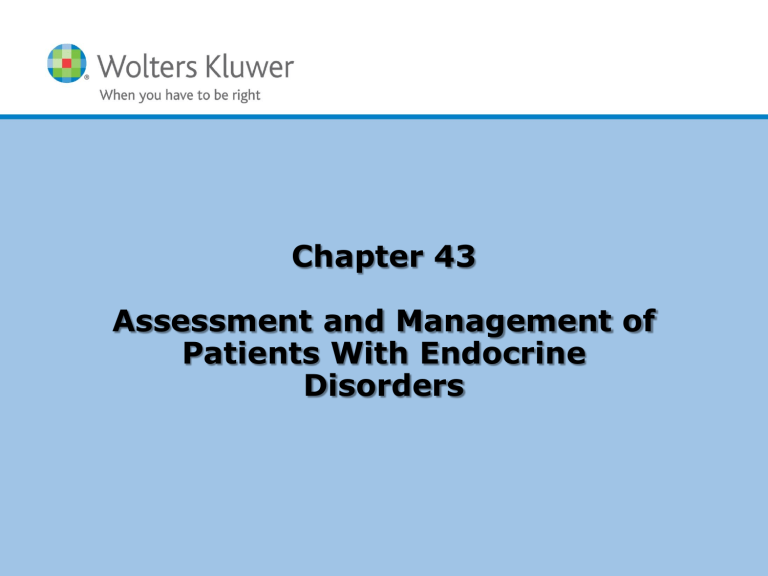
Chapter 43 Assessment and Management of Patients With Endocrine Disorders Copyright © 2014 Wolters Kluwer Health | Lippincott Williams & Wilkins Major Hormone-Secreting Glands of the Endocrine System (Fig. 43-1) Copyright © 2020 Wolters Kluwer • All Rights Reserved Thyroid Gland Thyroid hormones: T3 and T4; also produces calcitonin Iodine is contained in the thyroid hormone TSH from the anterior pituitary controls the release of the thyroid hormone TRH from the hypothalamus controls the release of TSH Thyroid hormone controls cellular metabolic activity T3 is more potent and more rapid-acting than T4 Calcitonin is secreted in response to high plasma calcium level and increases calcium deposition in bone Copyright © 2020 Wolters Kluwer • All Rights Reserved Thyroid Gland (contd.) (Fig. 43-3) Copyright © 2020 Wolters Kluwer • All Rights Reserved Hypothalamic—Pituitary--Thyroid Axis (Fig. 52-4) Copyright © 2020 Wolters Kluwer • All Rights Reserved Function of Thyroid Hormone Control cellular metabolic activity Important in brain development and necessary for normal growth Affects virtually every major organ system and tissue function Copyright © 2020 Wolters Kluwer • All Rights Reserved Thyroid Diagnostic Tests Thyroid-stimulating hormone (TSH) Serum-free T4 T3 and T4 T3 resin uptake Thyroid antibodies Radioactive iodine uptake Fine-needle aspiration biopsy Thyroid scan, radio scan, or scintiscan Serum thyroglobulin Copyright © 2020 Wolters Kluwer • All Rights Reserved Thyroid Disorders Cretinism Hypothyroidism Hyperthyroidism Thyroiditis Goitre Thyroid cancer Copyright © 2020 Wolters Kluwer • All Rights Reserved Hypothyroidism #1 Causes: autoimmune thyroiditis and Hashimoto’s disease (most common cause) (see Chart 43-3) Affects women five to eight times more frequently than men Manifestations o Early symptoms may be nonspecific Copyright © 2020 Wolters Kluwer • All Rights Reserved Hypothyroidism #2 Manifestations (contd.) o Fatigue; hair, skin and nail changes; numbness and tingling of fingers; menstrual disturbances; subnormal temperature and pulse; weight gain; subdued emotional and mental responses; slow speech; tongue, hands, and feet may enlarge; personality and cognitive changes; and cardiac and respiratory complications o Myxedema may progress to stupor, coma, and death Copyright © 2020 Wolters Kluwer • All Rights Reserved Medical Management of Hypothyroidism Synthetic levothyroxine replacement therapy Medication interactions o Effects of hypnotic and sedative agents: reduce dosage Support of cardiac function and respiratory function Prevention of complications Copyright © 2020 Wolters Kluwer • All Rights Reserved Hyperthyroidism The second most prevalent endocrine disorder Excessive output of thyroid hormone Graves’ disease (most common cause) Affects women 8 more frequently than men Manifestations of thyrotoxicosis: nervousness; palpitations; rapid pulse; poor heat toleration; tremors; skin is flushed, salmon colour, warm, soft, and moist (however, elders’ skin may be dry and pruritic); exophthalmos; increased appetite and dietary intake; weight loss; elevated systolic BP; may progress to cardiac dysrhythmias and heart failure Copyright © 2020 Wolters Kluwer • All Rights Reserved Medical Management of Hyperthyroidism Radioactive 131I therapy – see Chart 43-6 THYROID STORM Medications: see Table 43-3 o Propylthiouracil and methimazole o Sodium and potassium iodine solutions o Beta-adrenergic blockers Surgery: subtotal thyroidectomy Relapse of disorder is common Disease or treatment may result in hypothyroidism Copyright © 2020 Wolters Kluwer • All Rights Reserved Hyperthyroidism---Nursing Diagnoses Imbalanced nutrition Ineffective coping Low self-esteem Altered body temperature Copyright © 2020 Wolters Kluwer • All Rights Reserved Additional Thyroid Disorders Thyroiditis o Acute o Subacute o Chronic (Hashimoto’s disease) Thyroid tumours o Endemic (iodine-deficient) goitre o Nodular goitre o Thyroid cancer Copyright © 2020 Wolters Kluwer • All Rights Reserved Thyroidectomy Treatment of choice for thyroid cancer Cancer surgery may include modified or radical neck dissection, and may include treatment with radioactive iodine to minimize metastasis Preoperative goals include the reduction of stress and anxiety to avoid precipitation of thyroid storm Preoperative teaching includes dietary guidance to meet patient metabolic needs and to avoid caffeinated beverages and other stimulants, explanation of tests and procedures, and demonstration of proper postoperative head support Copyright © 2020 Wolters Kluwer • All Rights Reserved
